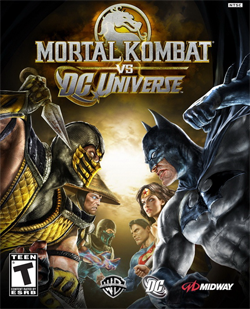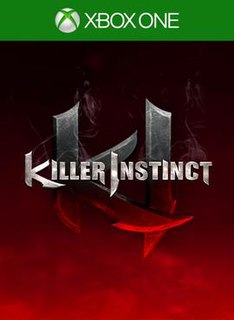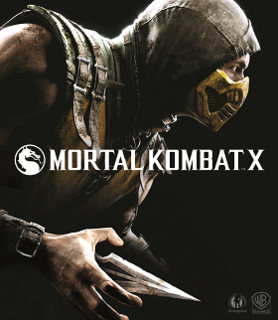
Mortal Kombat: Deadly Alliance is a 2002 fighting video game developed and published by Midway for the Xbox, PlayStation 2, GameCube, and Game Boy Advance. It was the first all-new Mortal Kombat fighting game produced exclusively for home consoles, with no preceding arcade release. Deadly Alliance is chronologically the fifth main game in the Mortal Kombat series. Its story focuses on the eponymous alliance between sorcerers Quan Chi and Shang Tsung and their schemes to revive an ancient army to conquer Outworld and Earthrealm. The game is the only main installment not to feature series protagonist Liu Kang as a playable character.

Thrill Kill is an unreleased fighting video game developed by Paradox Development for the PlayStation, originally scheduled for publication by Virgin Interactive in October 1998. The game's plot involves ten people, all of whom get sent to Hell after dying, being made by Marukka, the Goddess of Secrets, to fight to the death for a chance at being reincarnated. It was marketed as the first four-player 3D fighting game, as up to four players were able to play at once using the PlayStation Multitap. During rounds, instead of the standard health bar, each player is given a "kill meter" that increases with each successful attack. The game focuses on "Thrill Kills"—gory finishing moves which players perform after filling their "kill meter".

Sub-Zero is a fictional character in the Mortal Kombat fighting game franchise by Midway Games and NetherRealm Studios. A warrior from the fictional Lin Kuei clan, the character is principally defined by his ability to control ice in many forms. He is the only fighter to appear in every main installment of the series, along with being featured as the protagonist of the action-adventure spin-off Mortal Kombat Mythologies: Sub-Zero (1997).

Cyrax is a fictional character in the Mortal Kombat fighting game franchise by Midway Games and NetherRealm Studios. He debuted in Mortal Kombat 3 (1995) as a cyborg warrior of the fictional Lin Kuei clan. Cyrax is depicted as the heroic counterpart to his fellow Lin Kuei cyborg Sektor, eventually regaining his humanity and joining the Special Forces in their defense of Earthrealm.

Vampire: The Masquerade – Bloodlines is a 2004 action role-playing video game developed by Troika Games and published by Activision for Microsoft Windows. Set in White Wolf Publishing's World of Darkness, the game is based on White Wolf's role-playing game Vampire: The Masquerade and follows a human who is killed and revived as a fledgling vampire. The game depicts the fledgling's journey through the early 21st-century Los Angeles to uncover the truth behind a recently discovered relic that heralds the end of all vampires.

Kenshi Takahashi is a fictional character from the Mortal Kombat fighting game franchise by Midway Games and NetherRealm Studios. He debuted in Mortal Kombat: Deadly Alliance (2002) as a blind swordsman and operative for the Special Forces. In addition to his sword skills, he possesses telekinetic abilities.

Mortal Kombat: Deception is a fighting video game developed and published by Midway as the sixth installment of the Mortal Kombat (MK) video game franchise. It was released for the PlayStation 2 and Xbox in October 2004, for the GameCube in March 2005 and later ported for the PlayStation Portable under the title Mortal Kombat: Unchained in November 2006. Mortal Kombat: Deception follows the storyline from the fifth installment, Deadly Alliance. Its story centers on the revival of the Dragon King Onaga, who attempts to conquer the realms featured in the series after defeating the sorcerers Quan Chi and Shang Tsung, the main antagonists in the previous game, and the Thunder God Raiden, defender of Earthrealm. The surviving warriors from the previous titles join forces to confront Onaga.

Mortal Kombat is an American media franchise centered on a series of video games, originally developed by Midway Games in 1992. The development of the first game was originally based on an idea that Ed Boon and John Tobias had of making a video game starring Jean-Claude Van Damme, but as that idea fell through, a fantasy-themed fighting game was created instead, nonetheless paying homage to him with movie character Johnny Cage, whose initials and personal style resemble Van Damme's. Mortal Kombat was the first fighting game to introduce a secret fighter, reached if the player fulfilled a set of requirements.

Mortal Kombat vs. DC Universe is a crossover fighting video game between Mortal Kombat and the DC Comics fictional universe, developed and published by Midway Games. The game is also the eighth installment in the main Mortal Kombat series, despite the story not being connected to the first seven games or any other game that was released after this one. The game was released on November 16, 2008 and contains characters from both franchises. Its story was written by comic writers Jimmy Palmiotti and Justin Gray. The game was followed by a Mortal Kombat reboot in 2011 and by Injustice: Gods Among Us in 2013.

Mortal Kombat is a fighting video game developed by NetherRealm Studios and published by Warner Bros. Interactive Entertainment. The game is the ninth main installment in the Mortal Kombat series and a soft reboot of the franchise. The game was released for the PlayStation 3 and Xbox 360 systems in April 2011, and a PlayStation Vita port was released in May 2012. An expanded version of the game, titled Mortal Kombat: Komplete Edition, was released for Xbox 360 and PlayStation 3 in February 2012 and for Microsoft Windows in July 2013.

Mortal Kombat is an arcade fighting game developed and published by Midway in 1992. It is the first entry in the Mortal Kombat series and subsequently was released by Acclaim Entertainment for nearly every home platform of the time. The game focuses on several characters of various intentions who enter a martial arts tournament with worldly consequences. It introduced many key aspects of the Mortal Kombat series, including the unique five-button control scheme and gory finishing moves called Fatalities.

Injustice: Gods Among Us is a fighting video game based upon the fictional universe of DC Comics. The game was developed by NetherRealm Studios and published by Warner Bros. Interactive Entertainment for the PlayStation 3, Xbox 360, and Wii U. It was released in April 2013 in North America, Europe, and Australia, and June 2013 in Japan. An expanded version of the game, titled Injustice: Gods Among Us – Ultimate Edition, was released in November 2013 for the PlayStation 3, PlayStation 4, PlayStation Vita, Xbox 360, and Microsoft Windows. A free-to-play mobile app based on Injustice was also released for Android and iOS devices. A prequel comic book series of the same name, written by Tom Taylor, was released beginning in January 2013.

Pillars of Eternity is a role-playing video game developed by Obsidian Entertainment and published by Paradox Interactive. It was released for Microsoft Windows, OS X, and Linux on March 26, 2015. The game is a spiritual successor to the Baldur's Gate and Icewind Dale series, along with Planescape: Torment. Obsidian started a crowdfunding campaign on Kickstarter for it in September 2012. The campaign raised over US$4 million, which was the highest funded video game at the time. The game uses the Unity engine.

Killer Instinct is a fighting video game, the third in the Killer Instinct series, developed by Double Helix Games, Iron Galaxy and Rare under supervision of Ken Lobb, and published by Microsoft Studios, released as a free-to-play launch game for the Xbox One in 2013. The game is a reboot of the series, though some plot elements from Killer Instinct and Killer Instinct 2 have been retained. Development of the game involves individuals with histories in fighting games on both the developmental and competitive sides. It received positive reviews for its mechanics and engine, but was criticized for its initial lack of content. A second season of characters was released between 2014 and 2015. A third season, along with a port of the game for Windows 10, was released in 2016.

Mortal Kombat 11 is a fighting game developed by NetherRealm Studios and published by Warner Bros. Interactive Entertainment. Running on a heavily modified version of Unreal Engine 3, it is the eleventh main installment in the Mortal Kombat series and a sequel to 2015's Mortal Kombat X. Announced at The Game Awards 2018, the game was released in North America and Europe on April 23, 2019 for Microsoft Windows, Nintendo Switch, PlayStation 4 and Xbox One—with the exception of Europe's Switch version which was released on May 10, 2019. The game was released on the Stadia on November 19, 2019.

Mortal Kombat X is a fighting video game developed by NetherRealm Studios and published by Warner Bros. Interactive Entertainment. It was released on April 14, 2015 for Microsoft Windows, PlayStation 4, and Xbox One. NetherRealm Studios' mobile team developed a version for iOS and Android devices. High Voltage Software developed the PC version of the game, with Polish studio QLOC taking over the work on it shortly after the release of Kombat Pack 1.

Cities: Skylines is a 2015 city-building game developed by Colossal Order and published by Paradox Interactive. The game is a single-player open-ended city-building simulation. Players engage in urban planning by controlling zoning, road placement, taxation, public services, and public transportation of an area. Players work to maintain various elements of the city, including its budget, health, employment, and pollution levels. Players are also able to maintain a city in a sandbox mode, which provides more creative freedom for the player.

Souls is a series of action role-playing games developed by FromSoftware. The series began with the release of Demon's Souls for the PlayStation 3 in 2009, and was followed by Dark Souls and its sequels, Dark Souls II and Dark Souls III, in the 2010s. The series' creator, Hidetaka Miyazaki, served as director for each of them with the exceptions of Dark Souls II and the externally developed Demon's Souls remake.

Killer Instinct Gold is a 1996 fighting video game based on the arcade game Killer Instinct 2. The game was developed by Rare and released by Nintendo for the Nintendo 64 video game console. As in other series entries, players control characters who fight on a 2D plane set against a 3D background. Players press buttons to punch and kick their opponent in chains of successive hits, known as combos. Large combo successions lead to stronger attacks and brutal, stylistic finisher moves underscored by an announcer. Characters—including a gargoyle, a ninja, and a femme fatale—fight in settings such as a jungle and a spaceship. Killer Instinct Gold includes the arcade release's characters, combos, and 3D, pre-rendered environments, but excludes its full-motion video sequences and some voiceovers due to restrictions of the cartridge media format. The Gold release adds a training mode, new camera views, and improved audiovisuals.


















